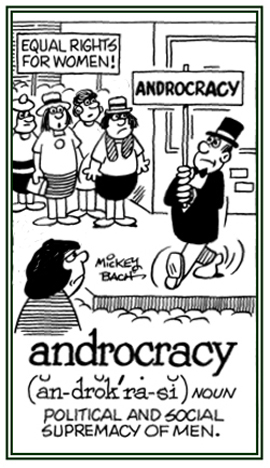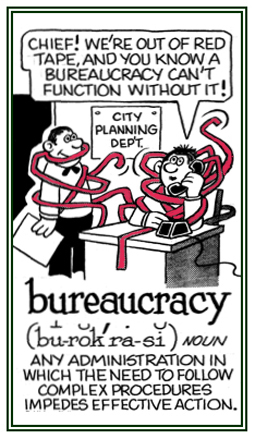-acy, -cy
(Latin: suffix; state, quality, condition, or act of; forming nouns)
2. The act of speaking or writing, in support of something, such as an idea, a cause, or a policy, and giving active support: Jane’s advocacy for the local animal rights group helped convince the public to donate more money for saving the lives of stray animals.

Go to this Word A Day Revisited Index
so you can see more of Mickey Bach's cartoons.
2. The government of a state by its “best” citizens: An aristocracy is that form of government in which the chief power lies in the hands of those who are most distinguished by birth or fortune or a political supremacy of a privileged order.
3. The class to which such a ruling body belongs, a patrician order: An aristocracy is the collective body of those, as the nobles, who form a privileged class with regard to the government of their country.
Aristocracy is popularly extended to include all of those who, by birth or fortune, occupy a position distinctly above the rest of the people and it is also used figuratively regarding those who are superior in other respects.
There are bad manners everywhere, but an aristocracy is bad manners organized.
If someone with arithmocracy wants to do away with criticism of the government with the hope of assuring national harmony, it would not get by with passing a law forbidding the media or private citizens from openly challenging any political decisions!
2. The commercial development of naturally occurring biological materials, such as plant substances or genetic cell lines, by a technologically advanced country, or an organization without fair compensation to the peoples or nations in whose territory the materials were originally discovered.
Biopiracy includes the patenting of plants, genes, and other biological products that are indigenous to a foreign country. For example, some developing tropical nations are saying that if the West cries foul over piracy of intellectual property or computer software, then biopiracy in Western labs of jungle extracts should also be considered a high economic crime.
Biopiracy usually refers to the privatization and unauthorized use of biological resources by entities (including corporations, universities, and governments) outside of a country that have pre-existing knowledge. This privatization and use is sometimes claimed to be predatory. Particular activities usually covered by the term are exclusive commercial rights to plants, animals, organs, microorganisms, and genes, as well as commercialization of traditional communities' knowledge on biological resources; and patenting of biological resources.
Here is a biopiracy article that presents an example of this topic.
2. The management or administration which is marked by hierarchical authority among numerous offices and by fixed procedures: Some government offices are accused of being a rigid bureaucracy and thus impeding or slowing down actions because of their overly strict adherence to rules or regulations.
To satisfy the government bureaucracy, James and Jane had to fill out several different forms and then they had to wait for some weeks before they obtained the payment that they had coming to them.
3. An administrative system in which the need or inclination to follow rigid or complex procedures interferes with efficient and effective actions: Innovative or new ideas too often get bogged down in red tape in a bureaucracy.Too often bureaucracies insist on going through rigid routines, resulting in delays in making decisions or in carrying out requests. This is also known as "red tape" which comes from the former use of red or pink tape to tie up or to seal official documents for security reasons.
Too often a bureaucracy is where more is said than is actually done.
Red tape is what binds bureaucracy together and it represents projects that are often never completed until the weight of the paper work is equal to the weight of all the workers who are involved.

Go to this Word A Day Revisited Index
so you can see more of Mickey Bach's cartoons.
Some people maintain that China has always been a chirocracy, and if this is true, there are also many other countries that fit this description.
Examples of additional nations that practice cheirocracy include North Korea, some Arabic countries, and even former President Trump of the U.S.A. who restricted immigrants coming in from Mexico with military forces.

